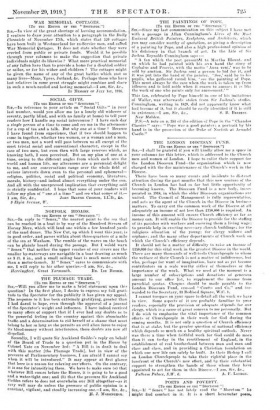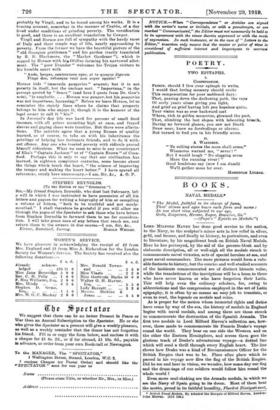POETS AND POVERTY.
• (To THE EDITOR OF THE " SPECTATOR.") SIR,—If " Senex " has not lately read the " Moretum " he might find comfort in it. It is a short hexameter poem,
probably by Virgil, and to be found among his works. It is a bracing account, somewhat in the manner of Crabbe, of a day lived under conditions of grinding poverty. The versification is good, and there is an excellent translation by Cowper.
Virgil and Horace are full of sympathy with the hardy races of Italy and their simple way of life, nearly approaching to poverty. From the former we have the beautiful picture of the " old Georgian gentleman " and his garden (racily translated by R. D. Blackmore, the " Market Gardener "), which is capped by Horace with his °kilns farming his narrowed allot- ment. The " poor Evander " welcomes his Trojan visitors to his humble court with "Aude, hospes, contemnere opes, et to quoque dignum Finge deo, rebusque veni non asper egenis! "
Horace bids " immunda pauperies" avaunt; but it is not poverty in itself, but the unclean sort. " Importune," in the passage quoted by " Senex " (and here I quote from Dr. Gow's note), "is emphatic. . . . Horace was pauper, but his pauperies was not importune, harassing." Before we leave Horace, let us remember the stately lines where he claims that property belongs to him who enjoys it, though it is the humour of the legal owner to call it " his."
In Juvenal's day life was hard for persons of small fixed incomes, with all prices mounting high at once, and frayed sleeves and gaping shoes were troubles. But there were allevia- tions. The satirists agree that a young Roman of quality learned, as of course, to take on with his inheritance the privilege of helping less fortunate friends, and to do it with- out offence. Any one who treated poverty with ridicule proved himself ridiculous. What we seem to miss is any counterpart of Elia's "Captain Jackson" or of " Captain Brown" of Cran- ford. Perhaps this is only to say that our civilization has learned, in eighteen completest centuries, some lessons about the things which touch the heart, " the science of improving the temper and making the heart better." I have spared all references, surely here unnecessary.—I am, Sir, &c., A. 0. P.











































 Previous page
Previous page